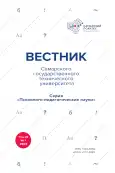Increasing the level of formation of educational motivation and cognitive independence in the study of natural sciences
- Authors: Filipovich L.A.1, Kondaurova I.G.1
-
Affiliations:
- Kemerovo State Agricultural Institute
- Issue: Vol 20, No 1 (2023)
- Pages: 87-100
- Section: Higher school education
- URL: https://journal-vniispk.ru/1991-8569/article/view/144067
- DOI: https://doi.org/10.17673/vsgtu-pps.2023.1.7
- ID: 144067
Cite item
Full Text
Abstract
The formation of students’ personal qualities aimed at learning, gaining new knowledge and skills to use this knowledge if necessary, is impossible without realizing the importance of the learning process for each student personally. Interest in educational activities and in the process of cognition itself, understanding of educational material can be formed only by using active, creative teaching methods. In our work, the use of practice-oriented tasks in the study of disciplines of the natural science cycle was considered. We suppose that in order to form and activate the interest of students in the study of natural sciences, it is necessary to model production problem situations that are solved with the help of knowledge and skills acquired in the classroom. If students understand how they can practically apply the theoretical knowledge gained in the classroom in their professional activities, then the study of complex material becomes more understandable and interesting. We distinguish two personal qualities of students, which prevail over others when considering the learning process – educational motivation and cognitive independence. It is necessary not only to form these qualities, but also to activate them in every possible way in the learning process for the successful acquisition of knowledge and skills that will be useful to a future specialist in his professional activity. The aim of the research was to determine whether the use of practice-oriented tasks has an impact on the formation and activation of students’ learning motivation and cognitive independence. The results of the study confirmed that the use of practice-oriented tasks in the study of disciplines of the natural science cycle has a positive impact on the formation and activation of students’ educational motivation and cognitive independence.
Full Text
##article.viewOnOriginalSite##About the authors
Larisa A. Filipovich
Kemerovo State Agricultural Institute
Email: laf.47@yandex.ru
Cand. Ped. Sci., Associate Professor of Environmental Management and Chemical Ecology Department
Russian Federation, 5, Markovtseva st., Kemerovo, 650056Irina G. Kondaurova
Kemerovo State Agricultural Institute
Author for correspondence.
Email: kondirina08@mail.ru
Cand. Ped. Sci., Associate Professor of Mathematics, Physics and Information Technologies Department
Russian Federation, 5, Markovtseva st., Kemerovo, 650056References
- Khasanova A.R. Ispol’zovaniye praktiko-oriyentirovannykh zadaniy dlya povysheniya motivatsii ucheniya [The use of practice-oriented tasks to increase the motivation of teaching]. Materialy VI Mezhdunarodnoy nauchno-prakticheskoy konferentsii «Aktual’nyye problemy razvitiya vertikal’noy integratsii sistemy obrazovaniya, nauki i biznesa: ekonomicheskiye, pravovyye i sotsial’nyye aspekty». Voronezh, December 26–27, 2017. Рр. 158–162.
- Khaibullin A.R., Iusupov R.G., Ershov V.F., Valeev A.S., Sitnova I.A. Development of innovative technologies in education. International Journal of Recent Technology and Engineering. 2019. Vol. 8. No. 3. Рр. 5947–5951.
- Bukharova A.V. Vospitaniye motivatsii ucheniya kak pedagogicheskaya problema [Education of teaching motivation as a pedagogical problemt]. Gumanitarnyye i sotsial’no-ekonomicheskiye nauki. 2012. No. 3. Рр. 159–161.
- Bozhovich L.I. Problemy formirovaniya lichnosti [Problems of personality formation]./ Moscow: Sfera Publ., 2007. 320 p.
- Zimnyaya I.A. Pedagogicheskaya psikhologiya: ucheb. posobiye [Pedagogical psychology: textbook]. Rostov-on-Don:Feniks Publ., 1997. 290 p.
- Karpova G.A. Pedagogicheskaya diagnostika uchebnoy motivatsii shkol’nikov [Pedagogical diagnostics of educational motivation of schoolchildren]. Yekaterinburg, 2006. 40 р.
- Morgan A. Theoretical Aspects of Project‐Based Learning in Higher Education. British Journal of Educational Technology. 2006. No. 14. Рр. 66–78. doi: 10.1111/j.1467-8535.1983.tb00450.x.
- Smirnova Zh., Vaganova O., Loshkareva D., Konyaeva E., Gladkova M. Practice-oriented approach implementation in vocational education. IOP Conference Series: Materials Science and Engineering. 2019. DOI:483. 012003. 10.1088/1757-899X/483/1/012003.
- Dolgova V.I., Belikov V.A., Kozhevnikov M.V. Partnership as a factor in the effectiveness of practice-oriented education of students. International Journal of Education and Practice. 2019. Vol. 7. No. 2. Рр. 78–87.
- Markova A.K. Formirovaniye interesa k ucheniyu u uchashchikhsya [Formation of interest in teaching among students]. http://www.koob.ru/age_psychology/ (accessed January 10, 2023).
- Markova A.K., Matis T.A., Orlov A.B. Formirovaniye motivatsii ucheniya: ucheb. posobiye [Formation of teaching motivation: a textbook]. Moscow: Prosveshcheniye, 2000. Pр. 192.
- Zimnyaya I.A. Pedagogicheskaya psikhologiya: ucheb. posobiye [Pedagogical psychology: textbook]. Rostov-on-Don: Feniks Publ., 1997. 290 p.
- Filipovich L.A., Kondaurova I.G., Stenina N.A. Formirovaniye uchebnoy motivatsii obuchayushchikhsya v agrarnom vuze [Formation of educational motivation of students in an agrarian university]. Aktual’nyye nauchno-tekhnicheskiye sredstva i sel’skokhozyaystvennyye problemy»: Materialy III Natsional’noy nauchno-prakticheskoy konferentsii. FGBOU VO Kuzbasskaya GSKhA, Kemerovo, 2019. Рр. 180–186.
- Aristova L.P. Vospitaniye poznavatel’noy samostoyatel’nosti shkol’nikov v protsesse obucheniya osnovam nauk iz opyta uchiteley shkol TASSR [Education of cognitive independence of schoolchildren in the process of learning the basics of sciences from the experience of teachers of schools of TASSR]. Kazan: Tatknigoizdat Publ., 1963. 54 p.
- Esipov B.P. Samostoyatel’naya rabota uchashchikhsya na urokakh [Independent work of students in the classroom]. Moscow: Uchpedgiz Publ., 1961. 239 p.
- Nizamov R.A. Didakticheskiye osnovy aktivizatsii uchebnoy deyatel’nosti studentov [Didactic bases of activation of educational activity of students]. Kazan: Publishing house of KSU, 1975. 302 p.
- Dayri N.G. Obucheniye istorii v starshikh klassakh [Teaching history in high school] Poznavatel’naya aktivnost’ uchashchikhsya i effektivnost’ obucheniya. Moscow: Prosveshcheniye Publ., 1966. 438 p.
- Danilov M.A. Vospitaniye u shkol’nikov samostoyatel’nosti i tvorcheskoy aktivnosti v protsesse obucheniya [Education of students’ independence and creative activity in the learning process]. Sovetskaya pedagogika. 1961. No. 8. Рp. 32–42.
- Lerner I.Ya. Didakticheskiye osnovy metodov obucheniya [Didactic foundations of teaching methods]. Moscow: Pedagogika Publ., 1981. 186 p.
- Shamova T.I. Aktivizatsiya ucheniya shkol’nikov [Activation of the teaching of schoolchildren]. https://search.rsl.ru/ru/record/01001087464 (accessed January 10, 2023).
- Filipovich L.A. Formirovaniye poznavatel’noy samostoyatel’nosti studentov sel’skokhozyaystvennogo vuza [Formation of cognitive independence of agricultural university students]. Kemerovo, 2006. 135 p.
- Kondaurova I.G., Filipovich L.A. Praktiko-oriyentirovannoye obucheniye pri izuchenii estestvenno-nauchnykh distsiplin v sel’skokhozyaystvennom vuze [Practice-oriented training in the study of natural sciences in an agricultural university]. Aktual’nyye nauchno-tekhnicheskiye sredstva i sel’skokhozyaystvennyye problemy: materialy III Natsional’noy nauchno-prakticheskoy konferentsii. FGBOU VO Kuzbasskaya GSKhA, Kemerovo, 2019. Рр. 148–155.
Supplementary files














